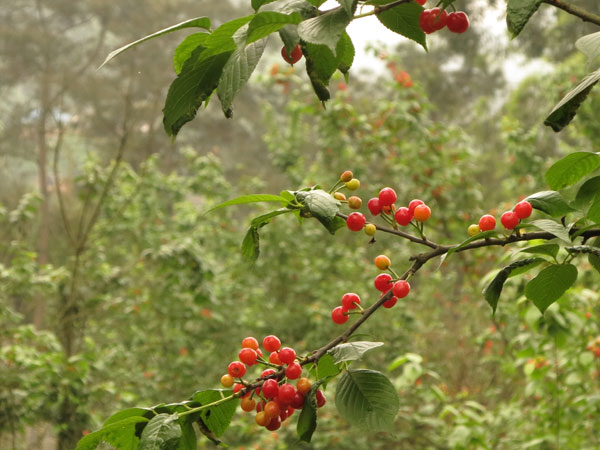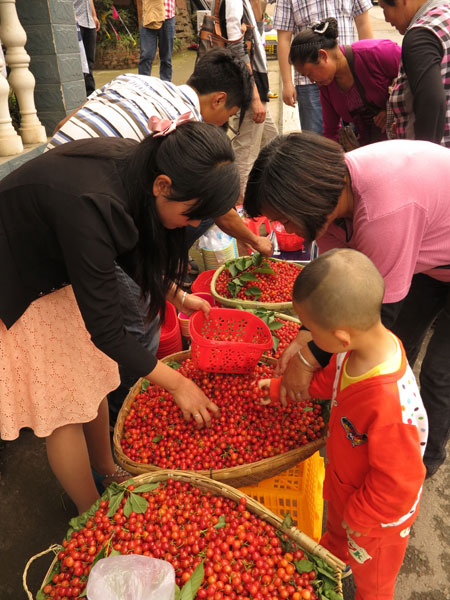Sichuan cherries add to province’s flavor
 0 Comment(s)
0 Comment(s) Print
Print E-mail China Daily, April 28, 2014
E-mail China Daily, April 28, 2014
|
|
|
Photo by Chen Liang/China Daily |
Pujiang in Sichuan province boasts lush forests, delicious cherries, great local cuisine and a pace of life that Chen Liang thinks is just about perfect.
'The flesh of our cherries is soft and juicy and easy to stone. You can put a handful in your mouth, enjoy the fresh pulp and then, spit the seeds out like a machine gun ..."
I came upon this florid description in a local newspaper while attending the opening ceremony of the second Pujiang Cherry Festival last week in Pujiang county, Chengdu, capital of Sichuan province.
There was a tray of fresh cherries on the table. I took a few handfuls, and although I didn't machine gun the seeds out of my mouth, I enjoyed the juicy and sweetly sour fruit a lot.
The cherries are not the black cherries native to North America and now popular in our markets, but the Nanking cherry, mainly distributed in northern and western China, Korea and Mongolia. Compared with the black cherry, it is scarlet, smaller, with thinner skin and often a little sour. Because it is difficult to store and transport, it is rarely found in markets far from areas where it is grown.
As a native of Chengdu living in Beijing, I haven't tasted the cherries for many years. During the festival, however, the cherries were everywhere - on the tables, in the baskets of the local villagers and even hanging on trees.
|
|
|
The Nanking cherries ripen on a tree on Cherry Hill in Pujiang county, Sichuan province. Villagers sell cherries along the road on the hill. Photo by Chen Liang / China Daily |
I choose not to walk to the fields of cherry trees and groves of tea trees to pick the fruit straight from the tree. Instead, after the Pujiang Cherry Festival's ceremony held at a small square on Cherry Hill, a 10-minute drive from the county town, I sat on the second floor of a local nongjiale home-stay's tea house. I sipped a cup of green tea harvested locally earlier this year, occasionally popping the cherries into my mouth. There was a soft breeze and a stunning panoramic view of the valley.
Cherries are only one of the reasons I was invited to visit Pujiang together with a group of journalists from Beijing, Shanghai and Guangzhou.
About 70 kilometers south of Chengdu, Pujiang boasts 50.8 percent forest coverage, the highest percentage of all counties in Sichuan province. With three big reservoirs, densely wooded hills and a few old towns, the county has long been a popular trip from Chengdu.
With many of China's major cities suffering from frequent fog and hazy weather, the good environment in Pujiang has given the area a fresh appeal.
Spring is the best season to visit Pujiang. I stayed at the Grande Valley International Country Club at the center of the Grande Valley Scenic Area, only 10 minutes' drive from the expressway between Pujiang and Chengdu. The air is moist and fresh with the mixed fragrance of flowers and green grass. The night is full of the sounds of insects calling.
I wanted to jog around the golf course but was stopped by a thunderstorm. I woke to birds' chirping outside my window and found that the country club is right in the middle of a golf course. Beyond the golf course are rolling hills and forests. A hike or jog around the scenic area is pleasant.
|
Photo by Chen Liang/China Daily |
Later in the morning, I found there is a well-paved road connecting the Grande Valley Scenic Area with Cherry Hill. It takes about one hour to hike from the valley to the hill. Passing through tea plantations and cherry orchids, the views along the road are beautiful.
We visited the Shixiang (Stone Elephants) Lake that afternoon. About 12 kilometers from the county town by expressway from Chengdu, the scenic area is known as one of the best places near Chengdu to admire flowers in different seasons.
The park's tulip exhibition had recently finished. But we still saw flowering patches of violet orychophragmus, iris, corn poppy and garden cosmos, spreading across the broad slope overlooking Shixiang Lake. The splash of color has attracted quite a few newlywed couples to have their wedding photos taken.
Walking down the flower-covered slope into a forest trail, you can soon descend to a dock. Buying a ticket for 30 yuan ($4.81), you can explore the lake on a paddle boat.
The lake is actually a reservoir surrounded by lush forests. The boat trip offers visitors a getaway into a tranquil world created by clean water and dense forests. The only down side of the boat trip is the mosquitos on the water.
To avoid getting bitten, you can also explore the area on the ground, from a trail built along the ridge overlooking the lake.
After a trip to Shixiang Lake, we drove about half an hour to Chengjia, a township known for its tea plantations. There we had a cup of this season's green tea, which is fragrant and refreshing.
Our dinner was at a restaurant surrounded by tea trees, where we had the chance to taste the locally famous liuhe (six-flavor) fish. Hot (from chili peppers), spicy (from Chinese prickly ash), scalding (from bubbling oil), sour (from pickles), fragrant (from the mixed sauce) and fresh, the dish features slices of fish and vegetables immersed in the mixed sauce and bubbling oil. It is served in a giant steel basin. The fish is hot, spicy, tender and fragrant as its name suggests.
Our two-day trip to Pujiang ended at Xilai Old Town. Dominated by buildings with black-tiled roofs, wooden structures and timber sliding doors, the riverside town offers visitors a glimpse into the region's traditional countryside life. Restaurants and teahouses line the riverbanks, where towering trees grow. Under the shade of the trees, local people drink, eat, chat and play cards or mahjong. The slow pace of life is truly attractive - I wish I could have stayed longer.
If you go
About 68 km south of Chengdu, Pujiang county is only 50 km from Chengdu Shuangliu International Airport. The Grande Valley Scenic Area is about 2 km from the county town. The Shixiang Lake Scenic Area is about 12 km from the county town and admission costs 60 yuan per person. The Xilai Old Town is about 13 km from the county town and 60 km from Chengdu. Quite a few restaurants in Chengjia township and the county town offer liuhe fish.










Go to Forum >>0 Comment(s)